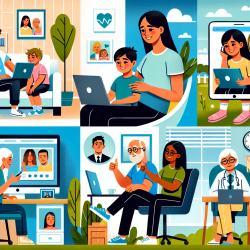Understanding the Challenges and Opportunities for Deaf Adolescents
Adolescence is a pivotal period of growth and development, marked by significant physical, emotional, and social changes. For deaf adolescents, these changes are compounded by the unique challenges of navigating a predominantly hearing world. The research article "Deaf Adolescents in a Hearing World: A Review of Factors Affecting Psychosocial Adaptation" provides valuable insights into the factors that influence the psychosocial adaptation of deaf adolescents. This blog aims to help practitioners improve their skills by implementing the outcomes of this research or encouraging further exploration.
Key Factors Influencing Psychosocial Adaptation
The research highlights several key factors that influence the psychosocial adaptation of deaf adolescents, including:
- Quality of Life: Deaf adolescents often report a lower quality of life compared to their hearing peers. Factors such as the use of cochlear implants (CIs), educational settings, and family communication play a significant role in shaping their experiences.
- Self-Concept and Identity Development: Developing a positive self-concept and identity is crucial for deaf adolescents. The research emphasizes the importance of early language exposure and shared communication systems in fostering a healthy self-concept.
- Social Integration: The choice between mainstream schools and deaf-specific programs has profound implications for social integration and identity development. While mainstream schools may offer cognitive benefits, deaf programs often provide better socioemotional support.
Practical Implications for Practitioners
Practitioners working with deaf adolescents can enhance their practice by considering the following strategies:
- Promote Early Language Exposure: Encourage families to provide a language-rich environment, whether through sign language or spoken language, to support the development of a positive self-concept and identity.
- Facilitate Family Communication: Work with families to improve communication skills and foster a supportive home environment, as this is linked to better quality of life and psychosocial outcomes.
- Advocate for Inclusive Education: Support educational settings that balance cognitive and socioemotional needs, ensuring that deaf adolescents have access to both academic and social opportunities.
Encouraging Further Research
While the research provides valuable insights, there are still gaps in our understanding of the psychosocial adaptation of deaf adolescents. Practitioners are encouraged to engage in further research to explore the complex interactions between factors such as hearing loss, educational settings, and family dynamics. By doing so, they can contribute to the development of evidence-based practices that support the optimal development of deaf adolescents.
To read the original research paper, please follow this link: Deaf adolescents in a hearing world: a review of factors affecting psychosocial adaptation.










